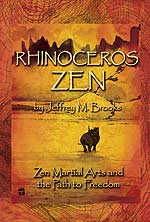THE ZEN MIRROR
The Nature of Water
By Jeff Brooks
The Niagara River is powerful and deep as it flow along slowly, mile
after mile. In an instant, without any hint of what is coming, it reaches
the falls and transforms, explodes into flumes, torrents, droplets and
sprays as it crashes violently into the rocks below. It bubbles, roils
and spins and settles down again forming a slow, deep river once again.
So what is the water really like? What is the true nature of the water?
Deep and peaceful? Chaotic and violent? Misty? Powerful?
The quality of the water is subject to conditions. Under some conditions
it is one way. When conditions change it is another way. It adapts to
the conditions as they change.
What is our true nature? Turbulent? Peaceful? Wise? Impulsive?
We also adapt to the conditions in which we find ourselves. The difference
between our selves and water is that to some degree we can determine the
conditions in which we live.
We do not have to be turbulent, angry, greedy, stupid, helpless or hurt.
We can act. If we learn what to do, gain the skills we need to act, and
then apply ourselves to acting wisely, we can create the best conditions
for our own lives.
Unexpected conditions will arise. One day we may go over the falls. But
if we have trained wisely and well we will recognize the conditions for
what they are, adapt to them and be able to accommodate them, without
fear or clinging.
People come in to our dojo and sometimes they tell me what kind of person
they are. They say “I am not flexible.” Or “I am very
strong.”
Whatever words they use to describe themselves, whatever attributes they
think they possess or lack, the fact is that none of it accurately describes
them. It describes their response to current conditions. If they attribute
these characteristics to themselves as if they were fixed, they will ultimately
lose the their strengths (by complacency) or fail to overcome their weaknesses
(by failing to make effort.)
If on the other hand they enter into training sincerely, that is to say
enter into a setting in which the conditions are perfect for their own
inner and outer development, they will get the results they want. They
will become who they wish to be. But only by acknowledging that our “true
nature” does not describe some permanent inherent characteristic
which we possess, but the fact that we are subject to conditions and reflect
a universe – of our own making or otherwise.
Once a year we ring the big 200 lb. Chinese iron bell in our dojo. One
day only. This is similar to the annual Japanese New Years celebration
Kagami Biraki, but not quite the same.
For an entire year the bell remains silent at the front of our dojo. During
every practice, every class, every meditation session it stays quiet.
The once a year the sound resonates through our dojo, through our building,
rings out across the whole neighborhood. The bell has no nature of creating
a great sound. But when the conditions are right it rings out loud and
strong. Then, when the conditions are withdrawn, silence returns.
It works the same way in our own hearts and minds. To the degree that
we can, we create the conditions in which we live. This is how we become
who we are.
Copyright Jeff Brooks and FightingArts.com
2007
About The Author:
Jeffrey Brooks, Seventh Degree Black Belt, has been the
director of Northampton Karate Dojo in Northampton, Massachusetts since
1987 and director of Northampton Zendo since 1993. He is a police officer
and police instructor, and the author of “Rhinoceros Zen –
Zen Martial Arts and the Path to Freedom.” His column Zen Mirror
and other articles appear on FightingArts.com.
New!
FightingArts.com is pleased to announce its first
book: “Rhinoceros Zen –Zen
Martial Arts and the Path to Freedom,” by Jeffrey Brooks, a work
that portrays the dual paths and interplay between Zen and Karate-do.
Fast paced
and easy to read, it is full of insight and wisdom. It is a rewarding
read for any martial artist.

(Softcover, 300 pages, illustrated)
FAS-B-001

|
|